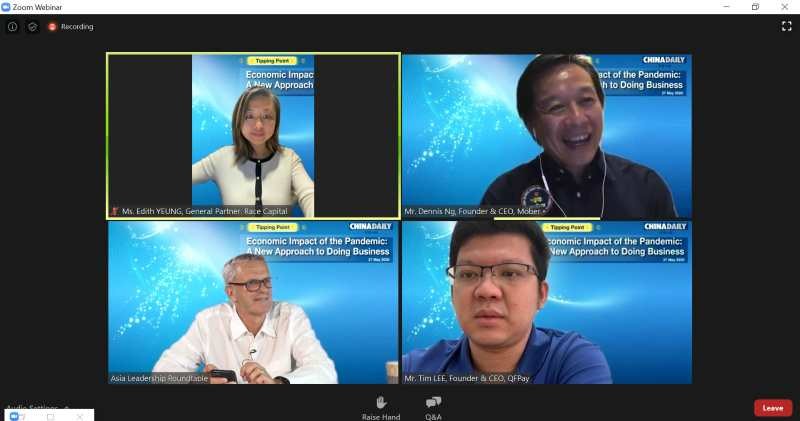2020-06-19

What are the survival strategies under the current economic climate? While many businesses are struggling to weather the economic storm brought about by the unprecedented public health crisis, others are seizing the moment to push ahead with innovations and changes they believe will help them become even stronger once the pandemic ends. To understand how businesses can adapt to the new economic environment, China Daily Asia Leadership Roundtable organized a virtual roundtable with prominent speakers Mr Tim Lee, founder & CEO of QFPay; Mr Dennis Ng, founder and CEO of Mober Technology Pte; and Ms Edith Yeung, general partner of Race Capital. Below are some of the key points made by them: Tim Lee has seen new business opportunities for his company, which provides e-payment solution, as travel restrictions forced people to stay at home, thus promoting e-commerce and mobile payment methods. Tim Lee: Online business and online channel will become the norm (after the pandemic). There will be more and more money and resources put on online channels. There will be faster mobile payment adoption, as cash could be seen as a carrier of COVID-19. People are likely to pursue a completely touchless payment solution. Tim Lee predicted that the pandemic will push faster development of mobile payment-related industries and digital businesses. Tim Lee: It’s really a good opportunity for all of us, and also our clients, to upgrade our mindsets and prepare for the future. If we take this chance to go digital, to go online, I think who survives will find themselves in an even better position than before the COVID-19 (pandemic). Dennis Ng told the panel his company is a same-day on-demand delivery solution provider in the Philippines. After the capital, Manila, was put under lockdown due to the pandemic in March, Ng saw the situation as an opportunity for his company to restructure and improve its services. Dennis Ng: During the lockdown, instead of reacting to on-demand delivery platforms, we decided to focus on how to make our business sustainable. So, what we did was to team up with big shopping malls in the Philippines as their logistic partner and give the customers an easy way to book deliveries. Dennis Ng believes that even after the pandemic is brought under control and the cities reopen, many people will continue to practice social distancing. That means there’ll be long queues in front of every shopping mall. Dennis Ng: The best solution is for the malls to continue allocating some areas as fulfillment centers, as they’re all located near the communities, unlike warehouses and logistic centers. It’ll make more sense for them to continue working together with companies like Mober in the future to deliver goods directly from malls to people’s doorsteps. Edith Yeung’s company – a venture capital and private equity firm – is looking at enterprises not just for who they’re now, but what they could be in 10 years’ time. Edith Yeung: I think it’s now the time when entrepreneurs and founders need to think hard about cutting costs and be realistic, as the hard time may last at least one to two years. I’ve always been saying the worst time is also the best time for some companies; those that are most adaptable will survive. We want to embrace early-stage startups and support not only the survivors but also the winners to hang in there. Edith Yeung advised companies to pitch for venture capital investment they desperately need during this tough business environment. Edith Yeung: Firstly, get used to online meetings with potential investors, put on a nice shirt and be professional. Secondly, some Chinese entrepreneurs tend to jump directly into introducing their products, while investors are actually more interested in the founder or the chief executive’s views about macro-economy, how they see the industry and what they know about their competitors. Lastly, they’ve to be well prepared and do the “homework”. Edith Yeung reckoned companies in certain fields will outperform amid the pandemic. Edith Yeung: Companies engaged in the pharmaceutical, biotech, cyber security and online education industries will outperform amid the pandemic. But, for those in the sharing economy, and travel and other offline, experience-dependent areas, it’ll be difficult.